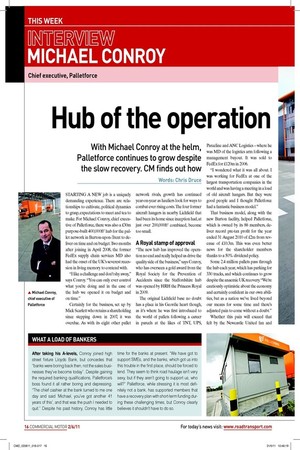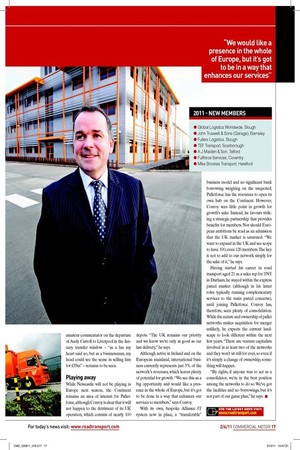Hub of the operation
Page 14

Page 15

If you've noticed an error in this article please click here to report it so we can fix it.
With Michael Conroy at the helm, Palletforce continues to grow despite the slow recovery. CM finds out how
Words: Chris Druce STARTING A NEW job is a uniquely demanding experience. There are relationships to cultivate, political dynamics to grasp, expectations to meet and tea to make. For Michael Conroy, chief executive of Palletforce, there was also a £30m purpose-built 400,000ft2 hub for the pallet network in Burton-upon-Trent to deliver on time and on budget. Two months after joining in April 2008, the former FedEx supply chain services MD also had the onset of the UK’s severest recession in living memory to contend with.
“I like a challenge and don’t shy away,” says Conroy. “You can only ever control what you’re doing and in the case of the hub we opened it on budget and on time.” Certainly for the business, set up by Mick Scarlett who retains a shareholding since stepping down in 2007, it was overdue. As with its eight other pallet
network rivals, growth has continued year-on-year as hauliers look for ways to combat ever rising costs. The four former aircraft hangers in nearby Lichield that had been its home since inception had, at just over 200,000ft2 combined, become too small.
A Royal stamp of approval
“The new hub has improved the operation no end and really helped us drive the quality side of the business,” says Conroy, who has overseen a gold award from the Royal Society for the Prevention of Accidents since the Staffordshire hub was opened by HRH the Princess Royal in 2009.
The original Lichield base no doubt has a place in his Geordie heart though, as it’s where he was irst introduced to the world of pallets following a career in parcels at the likes of TNT, UPS, Parceline and ANC Logistics – where he was MD of the logistics arm following a management buyout. It was sold to FedEx for £120m in 2006.
“I wondered what it was all about. I was working for FedEx at one of the largest transportation companies in the world and was having a meeting in a load of old aircraft hangars. But they were good people and I thought Palletforce had a fantastic business model.” That business model, along with the new Burton facility, helped Palletforce, which is owned by its 86 members, deliver record pre-tax proit for the year ended 31 August 2010 of £2m from revenue of £10.3m. This was even better news for the shareholder members thanks to a 50% dividend policy.
Some 2.4 million pallets pass through the hub each year, which has parking for 330 trucks, and which continues to grow despite the anaemic UK recovery. “We’re cautiously optimistic about the economy and certainly conident in our own abilities, but as a nation we’ve lived beyond our means for some time and there’s adjusted pain to come without a doubt.” Whether this pain will exceed that felt by the Newcastle United fan and amateur commentator on the departure of Andy Carroll to Liverpool in the January transfer window – “as a fan my heart said no, but as a businessman, my head could see the sense in selling him for £35m” – remains to be seen.
Playing away
While Newcastle will not be playing in Europe next season, the Continent remains an area of interest for Palletforce, although Conroy is clear that it will not happen to the detriment of its UK operation, which consists of nearly 100 depots. “The UK remains our priority and we know we’re only as good as our last delivery,” he says.
Although active in Ireland and on the European mainland, international business currently represents just 3% of the network’s revenues, which leaves plenty of potential for growth. “We see this as a big opportunity and would like a presence in the whole of Europe, but it’s got to be done in a way that enhances our services to members,” says Conroy.
With its own, bespoke Alliance IT system now in place, a “transferable” business model and no signiicant bank borrowing weighing on the unquoted, Palletforce has the resources to open its own hub on the Continent. However, Conroy sees little point in growth for growth’s sake. Instead, he favours striking a strategic partnership that provides beneits for members. Nor should European ambitions be read as an admission that the UK market is saturated. “We want to expand in the UK and see scope to have 100, even 120 members. The key is not to add to our network simply for the sake of it,” he says.
Having started his career in road transport aged 21 as a sales rep for TNT in Durham, he stayed within the express parcel market (although in his latter roles typically running complementary services to the main parcel concerns), until joining Palletforce. Conroy has, therefore, seen plenty of consolidation. While the nature and ownership of pallet networks makes acquisition for merger unlikely, he expects the current landscape to look different within the next few years. “There are venture capitalists involved in at least two of the networks and they won’t sit still for ever, so even if it’s simply a change of ownership, something will happen.
“By rights, if anyone was to act as a consolidator, we’re in the best position among the networks to do so. We’ve got the facilities and no borrowings, but it’s not part of our game plan,” he says. ■














































